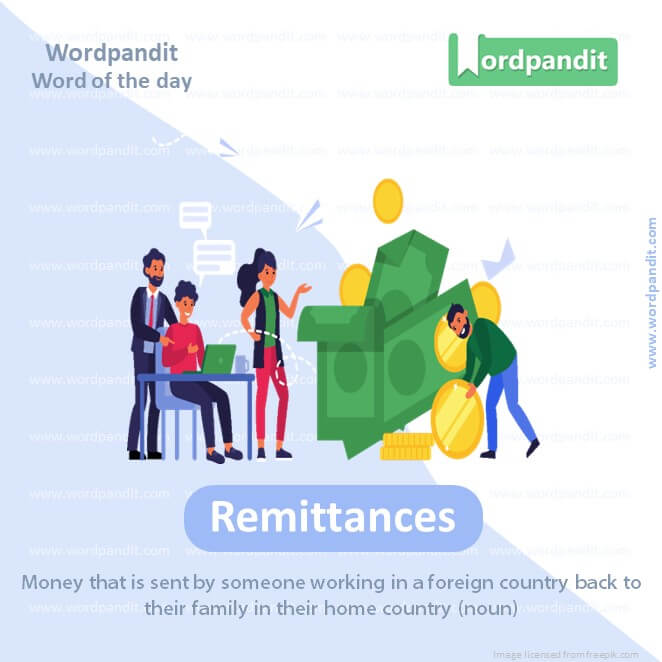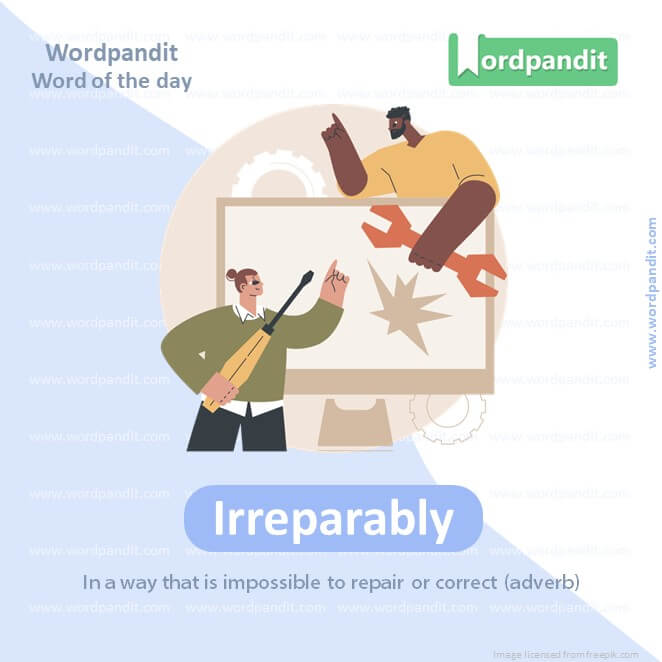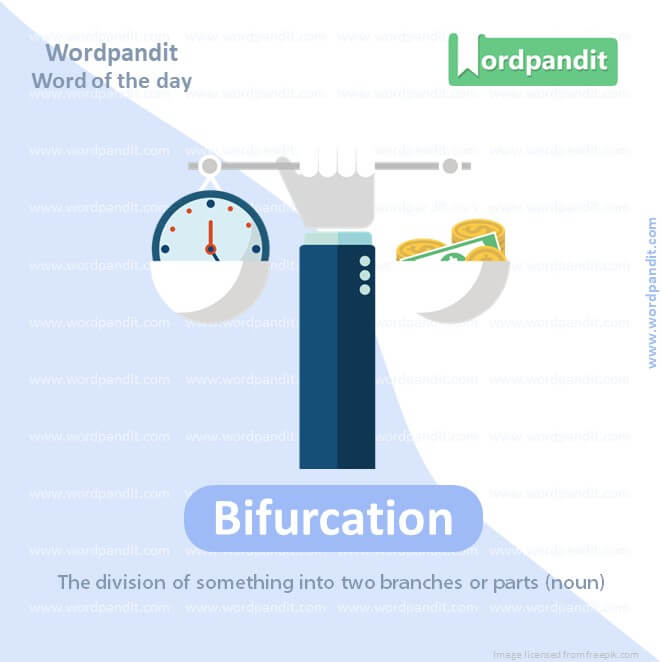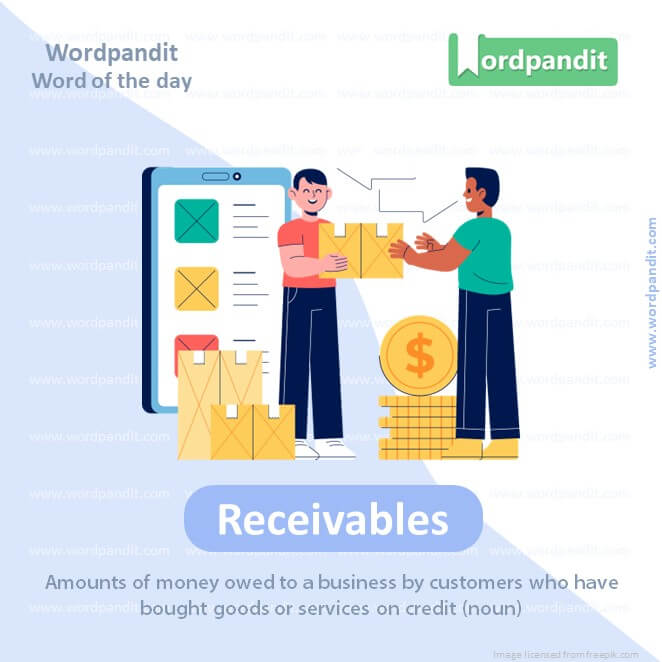Daily Vocabulary Words: List of Daily Used Words
Hi there. Welcome to this special section @ Wordpandit.
Our endeavour here is straightforward: highlighting important daily vocabulary words, you would encounter in The Hindu. This is your repository of commonly used words; essentially, we are posting a list of daily used words. Hence, this has significant practical application as it teaches you words that are commonly used in a leading publication such as The Hindu.
Visit the website daily to learn words from The Hindu.

WORD-1: Remittances
CONTEXT: The obvious answers are the origin and destination country governments; remittances and investments, transfer of knowledge and return migration for development engagement; for the two countries and their migrants, and families, and their diaspora members.
SOURCE: The Hindu
EXPLANATORY PARAGRAPH: Imagine you’ve moved far away, but you send a part of your pocket money back to your little sister at home. This money you send back is called a “remittance.”
MEANING: Money that is sent by someone working in a foreign country back to their family in their home country. (noun)
PRONUNCIATION: Rehmittances
SYNONYMS: Payment, Transfer, Transmission, Shipment, Dispatch, Money sent, Funds
USAGE EXAMPLES:
1. Many families depend on remittances from their relatives abroad.
2. The country saw a rise in remittances last year.
3. She sends remittances home every month to support her family.
4. The government is trying to simplify the process of sending remittances.

WORD-2: Harmoniously
CONTEXT: Sikhs of Indian origin dominate the Canadian tapestry of the Indian diaspora, coexisting harmoniously with other religions.
SOURCE: The Hindu
EXPLANATORY PARAGRAPH: Imagine all the colors of a rainbow fitting together perfectly. When things work together in a nice and smooth way, like the colors of a rainbow, they’re working “harmoniously.”
MEANING: In a manner that is pleasingly consistent and combined well with others. (adverb)
PRONUNCIATION: Harmokneeusly
SYNONYMS: Peacefully, Amicably, Agreeably, Congenially, Cooperatively, Synchronously, Coherently
USAGE EXAMPLES:
1. The two singers performed harmoniously.
2. Different communities lived harmoniously in the town.
3. The elements of the painting blend harmoniously.
4. Their ideas integrated harmoniously into the project.

WORD-3: Irreparably
CONTEXT: The strain in ties would irreparably erode the cherished values of trust, time and loyalty to the detriment of the Global Compact for Safe, Orderly and Regular Migration and the SDGs globally.
SOURCE: The Hindu
EXPLANATORY PARAGRAPH: Imagine a toy you break and can’t fix, no matter how much glue or tape you use. When something can’t be fixed or made better, it’s “irreparably” damaged.
MEANING: In a way that is impossible to repair or correct. (adverb)
PRONUNCIATION: Irreparably
SYNONYMS: Permanently, Irrevocably, Unfixably, Hopelessly, Unchangeably, Irreversibly, Irremediably
USAGE EXAMPLES:
1. The vase was irreparably broken.
2. The relationship was damaged irreparably.
3. The document was irreparably lost in the fire.
4. Her actions caused irreparably harm to their trust.

WORD-4: Bifurcation
CONTEXT: The Andhra Pradesh government argued that Telangana should pay ₹3,441.78 crore in principal and ₹3,315.14 crore late payment surcharge for the power supplied to it post bifurcation.
SOURCE: The Hindu
EXPLANATORY PARAGRAPH: Think of a road that splits into two different paths. This splitting or division is called “bifurcation.”
MEANING: The division of something into two branches or parts. (noun)
PRONUNCIATION: Byfurcayshun
SYNONYMS: Splitting, Division, Separation, Forking, Divergence, Branching, Partition
USAGE EXAMPLES:
1. The river’s bifurcation created two distinct pathways.
2. The bifurcation of the company led to two new entities.
3. At the bifurcation, he chose the path to the left.
4. The study explores the bifurcation of societal norms.

WORD-5: Receivables
CONTEXT: It started that the total receivables from Andhra Pradesh power utilities was ₹17,420 crore, while dues payable to APGENCO were to the tune of ₹4,887 crore, which left a balance of ₹12,532 crore receivable by Telangana.
SOURCE: The Hindu
EXPLANATORY PARAGRAPH: Imagine if you had a little shop and you sold toys, but some kids said they’d pay you later. The money they promise to give you later is called “receivables.”
MEANING: Amounts of money owed to a business by customers who have bought goods or services on credit. (noun)
PRONUNCIATION: Rehseevuhbuls
SYNONYMS: Outstanding, Debts, Owings, Due amounts, Accounts receivable, Payables, Credits
USAGE EXAMPLES:
1. The company’s receivables have increased this quarter.
2. They hired an agency to collect overdue receivables.
3. We need to monitor our receivables closely.
4. The accounting team is reconciling the receivables.
WORD-6: Intervene
CONTEXT: The Centre remained silent on several issues that have been awaiting resolution if it had the power to intervene.
SOURCE: The Hindu
EXPLANATORY PARAGRAPH: Imagine two of your friends are having an argument, and you step in between them to help sort things out. When you step in to help or change a situation, that’s called “intervene.”
MEANING: To come or occur between events, or to become involved in a situation in order to change what is happening. (verb)
PRONUNCIATION: Interveen
SYNONYMS: Interfere, Meddle, Intrude, Step in, Interpose, Interject, Arbitrate
USAGE EXAMPLES:
1. The teacher had to intervene when the students started arguing.
2. The government decided to intervene in the market to stabilize prices.
3. I’d rather not intervene in their family matters.
4. An unexpected event intervened, and the picnic was canceled.
WORD-7: Detrimental
CONTEXT: There were many instances of Andhra Pradesh power utilities taking decisions detrimental to the interests of Telangana without acting on the advice of the southern regional load dispatch centre.
SOURCE: The Hindu
EXPLANATORY PARAGRAPH: Imagine eating too much candy and getting a tummy ache. Eating too much candy isn’t good for your health. When something causes harm or damage, it’s called “detrimental.”
MEANING: Causing harm or damage. (adjective)
PRONUNCIATION: Detrimental
SYNONYMS: Harmful, Damaging, Hurtful, Injurious, Adverse, Deleterious, Unfavorable
USAGE EXAMPLES:
1. Smoking is detrimental to your health.
2. The harsh sunlight was detrimental to the plants.
3. Constant criticism is detrimental to one’s self-esteem.
4. Overwatering is detrimental to this particular flower.
WORD-8: Unprecedented
CONTEXT: Pernicious access to nutritionally dense unhealthy foods and unprecedented exposure to toxic chemicals and heavy metals.
SOURCE: The Hindu
EXPLANATORY PARAGRAPH: Imagine if you saw a purple elephant flying in the sky. You’ve never seen that before, right? When something has never happened or been seen before, it’s called “unprecedented.”
MEANING: Never having happened or existed before. (adjective)
PRONUNCIATION: Unpresssedented
SYNONYMS: Unheard of, Novel, New, Unique, Unparalleled, Exceptional, Extraordinary
USAGE EXAMPLES:
1. The athlete’s achievement was unprecedented in the history of the sport.
2. We are facing an unprecedented crisis.
3. The response to the product launch was unprecedented.
4. The world saw unprecedented technological growth in the past decade.
WORD-9: Paradigm
CONTEXT: The design of the built local environment as well as provisioning systems represents a new paradigm for public health.
SOURCE: The Hindu
EXPLANATORY PARAGRAPH: Think about a special model or example that everyone likes and wants to follow. “Paradigm” is a fancy word that means a model or example that is very clear and typical.
MEANING: A typical example or model of something; a pattern or mode of thinking. (noun)
PRONUNCIATION: Paruhdime
SYNONYMS: Model, Example, Pattern, Exemplar, Prototype, Standard, Template
USAGE EXAMPLES:
1. The company is seen as a paradigm of success.
2. His work has shifted the prevailing paradigm in the field.
3. She set a new paradigm with her innovative approach.
4. The old paradigms of business no longer apply in the digital age.
WORD-10: Disparities
CONTEXT: Class, race, age, migrant, and disability status, translating to vast disparities in health risks and outcomes.
SOURCE: The Hindu
EXPLANATORY PARAGRAPH: Imagine two friends: one has ten candies and the other has only one candy. The big difference in the number of candies they have is a disparity.
MEANING: Differences, especially ones related to unfairness or inequality. (noun)
PRONUNCIATION: Disparitees
SYNONYMS: Inequalities, Imbalances, Divergences, Variances, Discrepancies, Differences, Gaps
USAGE EXAMPLES:
1. There are major disparities in wealth between the two regions.
2. The study highlights the disparities in healthcare access.
3. Efforts are being made to reduce educational disparities.
4. She pointed out the disparities in treatment based on gender.
Vocabulary
Language is a confluence of thoughts, emotions, and experiences that find vibrant expression through words. In this spectrum, ‘vocabulary’ shines as a critical aspect that shapes and directs our language proficiency. It offers depth, nuance, and clarity to our expressions. However, mastering ‘vocabulary’ is an art that requires a strategized approach.
An intensive strategy for learning ‘vocabulary’ goes beyond the limiting precincts of memorization. Instead, it nudges learners towards comprehension and application. To understand ‘vocabulary’, take a step forward from traditional textbooks and classroom sessions, and embrace the vast world of books, articles, podcasts or digital content in the language you are learning. This step allows you to understand words in context, see how they are used in different situations, and absorb words as part of the natural flow of language.
As you journey through ‘vocabulary’, remember that this expedition should not be a race. Rather, it’s a marathon where pacing yourself is pivotal to long-term success. Learning a few words each day and consolidating your knowledge through regular revision tends to be more effective, as it prevents cognitive overload and promotes solid retention.
Interactive learning tools can provide valuable support in assimilating ‘vocabulary’. Use of flashcards, language-learning apps, or memory-enhancing software can make this process more engaging and effective, reinforcing the ‘vocabulary’ in your memory.
Lastly, practice is an incontrovertible part of mastering ‘vocabulary’. Utilize the learnt vocabulary in your daily conversations, write-ups, or presentations to ensure an active application. Doing this fosters recall and cements understanding.
In summation, learning ‘vocabulary’ is a journey that should be embraced with an integrated approach, where understanding and application are the key elements. By engaging with diverse learning resources, pacing the learning process, employing interactive learning tools, and practicing regularly, the journey of mastering ‘vocabulary’ becomes a fulfilling and enriching experience.











